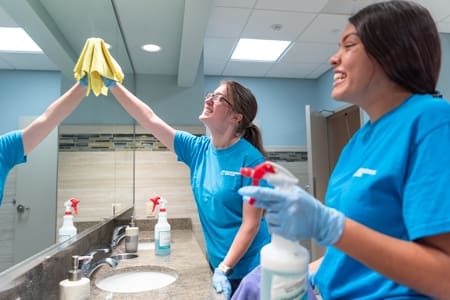
At Pensacola Christian College, offering students an affordable and attainable education is a top priority—and is why an abundance of financial aid options are available. The Work Assistance Program is an option that empowers students to fund their education through meaningful work. Through it, students can graduate with little to no debt, working at convenient locations in diverse departments and positions.
Karina Jones (Sr., AL), who works in Environmental Services, has experienced firsthand the blessing of being able to work in college. “Paying my way through college has been extremely beneficial because it has allowed me to truly appreciate the education I have,” she explained. “And it has allowed me to gain important life skills and meet some of my best friends. I have learned good traits about being a leader as well as how to balance a schedule.”

A Program Designed for You
A manageable workweek is one of the first things a student can expect, with 8 to 20 hours on the job. Supervisors work closely with students’ class schedules to ensure their work schedules won’t conflict, creating an individualized experience. “The Work Assistance Program is a very attractive job opportunity for students who need work but are worried about scheduling,” said Andrew Sallmen (Fr., FL), who works in Maintenance. “[It] works around one’s class schedule, making a part-time job very convenient.”
Another major convenience is working on campus. Almost all locations are within walking distance, and for the few areas that are off campus, like Pensacola Christian Academy and the Print Shop, a shuttle is available for roundtrip transportation.
As students work, they connect with their peers and supervisors, building on important networking and interpersonal skills. “Everyone I work with is very pleasant and can make it fun too,” said Gracie Jainchill (Jr., MO), who works at the Distribution Center (DC). “The supervisors are very kind and understanding. I believe they care about each worker in the DC and want to see each of us succeed in the workforce.”
Additional Opportunities to Earn

All student workers can stay during the summer or winter interterm to continue earning money, with 40-hour workweeks in a more relaxed atmosphere on campus. When working summers, students earn higher wages and have the option to attend different activities like coed sports, Summer Theatre, Youth Outreach Ministry camp services, and more.
Students looking to graduate completely debt-free can apply for the Contract Work Program after completing one semester at PCC. This program starts with 5 credit hours a semester and 35 work hours a week for two semesters. After that, a student will reduce their work hours to take more course credits. Contract students also work 40-hour weeks during the summer and winter interterm, allowing them to graduate with financial freedom in five years.
Learning to Navigate the Workforce
The Work Assistance Program also encourages good employment practices and professionalism in students—with God at the center. “By working on campus, students can engage with and learn from proven Christian leaders and participate in the unique mission God has given to PCC and its affiliates,” said Brandon Roberts, Student Employment director. “They learn how to navigate a professional workplace and receive training that will enable them to be successful in various work settings and contexts—in both Christian and secular industries.”

While students work to earn money, they also gain valuable work experience and build their résumés. Ethan Dryden (Sr., IL), currently a residence assistant (RA) in Rice Tower, has held many positions, never missing an opportunity to learn and grow. “Working at Common Grounds Café, my first job ever, helped me transition from home life to the working field,” he shared. “It allowed me to become comfortable working with and for others and figuring out job-related interpersonal relationships. Working in Dining Services taught me how to perform specific tasks more efficiently each time they were to be done. In all these areas, responsibility and expectations have helped prepare me for life after college.”
At the Rebekah Horton Library, Hailey Hubbart (So., IL) practices a wide range of skills as she assists patrons across different floors, in the research center, at the circulation desk, and at the testing center. “My daily responsibilities vary from shift to shift due to the range of areas I work in,” she said. “But usually, my responsibilities include shelving books, helping patrons, and shelf-reading.”
Student workers fill positions that help PCC run smoothly and efficiently, with some positions even reaching outside of campus life. For Daisy Walker (Fr., FL), a representative at Abeka Customer Service, a work shift consists of answering phone calls, emails, and chats to deliver the best customer service possible. “I love getting to talk with Abeka customers and help them with their problems to make their school year as smooth as possible,” said Daisy.
The Work Assistance Program aims to turn financial obstacles into open opportunities so that students can earn their degrees—beginning their futures with little to no debt. Combining that with low tuition rates and many other fantastic opportunities, students can earn their degrees with peace of mind.
